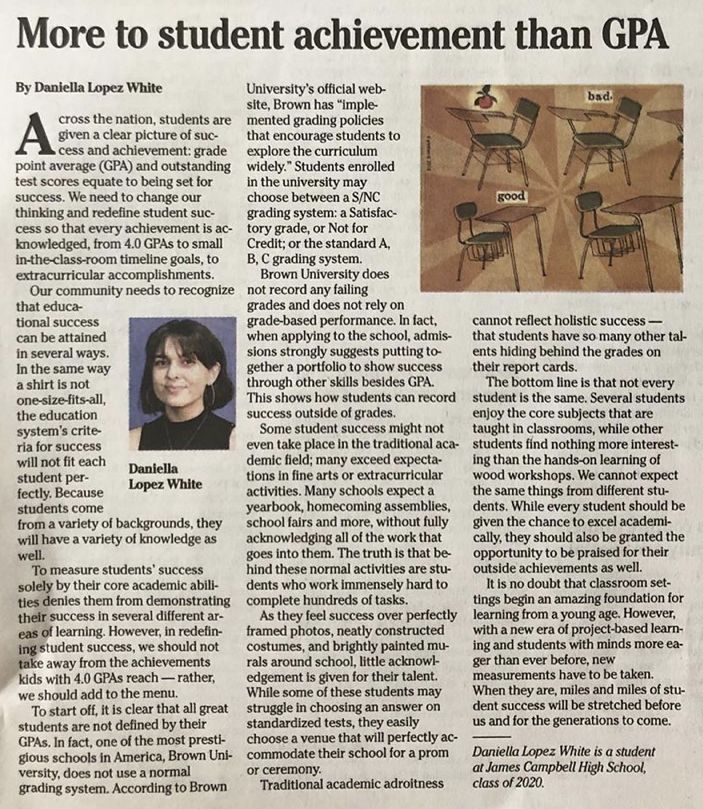Across the globe, countries have acted to address the crisis of cellphone use in schools. From school districts in California to nations such as South Korea, many school systems recognize the harm that unchecked screen use poses to student engagement and learning. In contrast, Hawaiʻi doesn't have a consistent statewide phone policy.
The following editorial was originally published in the Honolulu Star-Advertiser on Sunday, December 1, 2019 as part of the "Raise Your Hand" column in the Insights section.

By: Daniella Lopez White, James Campbell High School, Class of 2020
Across the nation, students are given a clear picture of success and achievement: Grade Point Average (GPA) and outstanding test scores equate to being set for success. We need to change our thinking and redefine student success so that every achievement is acknowledged, from 4.0 GPAs to small in-the-class-room timeline goals, to extracurricular accomplishments.
Our community needs to recognize that educational success can be attained in several ways. In the same way a shirt is not one-size-fits-all, the education system’s criteria for success will not fit each student perfectly. Because every student comes from a variety of backgrounds, they will have a variety of knowledge as well. To measure a student’s success solely by their core academic abilities denies them of demonstrating their success in several different areas of learning. However, in redefining student success, we should not take away from the achievements kids with 4.0 GPAs reach, rather we should add to the menu.
To start off, it is clear that all great students are not defined by their GPAs. In fact, one of the most prestigious schools in America, Brown University, does not use a normal grading system. According to Brown University’s official website, Brown has “implemented grading policies that encourage students to explore the curriculum widely.” Students enrolled in the university may choose between a S/NC grading system- a Satisfactory grade, or Not for Credit- or the standard A, B, C grading system. Brown University does not record any failing grades and does not rely on grade-based performance. In fact, when applying to the school, admissions strongly suggests putting together a portfolio to show success through other skills besides GPA. This shows how students can record success outside of grades.
Some student success might not even take place in the traditional academic field; many exceed expectations in fine arts or extracurricular activities. Many schools expect a yearbook, homecoming assemblies, school fairs, and more without fully acknowledging all of the work that goes into it. The truth is that behind these normal activities are students who work immensely hard to complete hundreds of tasks. As they feel success over perfectly framed photos, neatly constructed costumes, and brightly painted murals around school, little acknowledgement is given for their talent. While some of these students may struggle in choosing an answer on standardized tests, they easily choose a venue that will perfectly accommodate their school for a prom or ceremony. Traditional academic adroitness cannot reflect holistic success--that students have so many other talents hiding behind the grades on their report cards.
The bottom line is that not every student is the same. Several students enjoy the core subjects that are taught in classrooms, while other students find nothing more interesting than the hands-on learning of wood workshops. We cannot expect the same things from different students. While every student should be given the chance to excel academically, they should also be granted the opportunity to be praised for their outside achievements as well. It is no doubt that classroom settings begin an amazing foundation for learning from a young age. However, with a new era of project-based learning and students with minds more eager than ever before, new measurements have to be taken. When they are, miles and miles of student success will be stretched before us and for the generations to come.
Related Articles
When people talk about the dangers of artificial intelligence, many imagine their jobs and decisions taken fromthem by machines. But the more immediate danger looks very different — that we are instead willingly surrendering to AI. The danger of artificial intelligence is not that machines may become conscious, but that people may gradually surrender skills that require independence, patience, soul and critical thinking.
For decades, the concept of patriarchy has defined our social and political discourse, framing the
world as one where men inherently hold the advantage and women are systemically disadvantaged. This narrative, which has played a powerful role in achieving gender equity, remains deeply entrenched in public consciousness.
Amid the relative quietness of Hawaii’s political landscape, the most consequential election of this year is one over 5,000 miles away: the New York City mayoral race. It’s a three-man race among Democrat Zohran Mamdani, Republican Curtis Sliwa and former New York Gov. Andrew Cuomo who is running as an independent.
